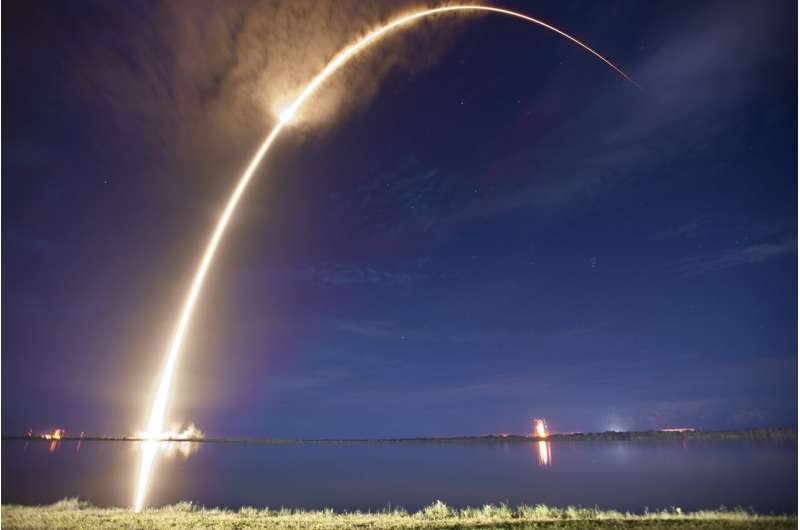This article has been reviewed according to Science X's editorial process and policies. Editors have highlighted the following attributes while ensuring the content's credibility:
fact-checked
reputable news agency
proofread
SpaceX ends nearly two-week lull with Space Coast launch

A late scrub due to weather on Tuesday that also took a Wednesday attempt off the board continued SpaceX's Cape Canaveral launch attempt woes of late, but it finally managed a liftoff on June 20, going close to 13 days between launches from the Space Coast, the longest run since late 2022.
It was not for a lack of trying, though, as bad weather and a scrub as the countdown clock hit 0 last week took a different SpaceX mission off the board. That led to SpaceX taking down that mission's Falcon 9 rocket and switching it up with a Falcon 9 rocket this week to launch a European TV satellite.
The first try on Tuesday night, though, faced high winds at the launch site, forcing a scrub just minutes before liftoff. SpaceX then called off a Wednesday attempt because of "ongoing unfavorable weather at the launch and recovery sites."
The company then shifted to Thursday, and finally managed the launch of the SES 24 mission, lifting off at 5:35 p.m. Eastern time from Cape Canaveral Space Force Station's Space Launch Complex 40. The payload is the ASTRA 1P satellite for Luxembourg-based communications company SES that will provide service for 190 million TV market households in Germany, Spain and France, replacing the job of four older SES satellites.
This was the 12th time SpaceX has flown dedicated satellite missions for SES, including the 2017 mission that marked the first time SpaceX had reused a Falcon 9 booster. Including this flight, SpaceX has reflown boosters 291 times on either Falcon 9 or Falcon Heavy missions.
The first-stage booster for this flight made its ninth trip to space, and made another landing downrange on the droneship Just Read the Instructions, the 320th time it has recovered a booster and 250th landing on a droneship.
SpaceX last launched from the Space Coast on June 7, and the nearly 13 full days between launches was the longest since a more-than-13-day run from Nov. 26-Dec. 8, 2022.
SpaceX tried to launch from the Cape last week, though, but an issue with the Falcon 9 at ignition forced a scrub, and that mission's new launch date has yet to be announced.
The SES 24 mission marked the 45th launch from either Canaveral of neighboring Kennedy Space Center for the year, with all but three coming from SpaceX. It's the 62nd Falcon 9 mission for the year for SpaceX, including California launches. SpaceX also flown its in-development Starship and Super Heavy twice on orbital test flights from Texas.
The next launch from KSC could be SpaceX's first Falcon Heavy launch of the year, targeting a June 25 liftoff from Launch Pad 39-A during a two-hour window that opens at 5:16 p.m.
Its payload is the GOES-U satellite for the National Oceanic and Atmospheric Administration that will next year take over the duties of watching the Atlantic basin for tropical and other dangerous weather.
SpaceX has launched its Falcon 9 rocket successfully 346 out of 347 times since its debut in 2010, with a lone in-flight launch failure in 2015. It's also flown its Falcon Heavy nine times since 2018 and attempted four Starship and Super Heavy launches since 2023 reaching orbit twice.
2024 Orlando Sentinel. Distributed by Tribune Content Agency, LLC.




















